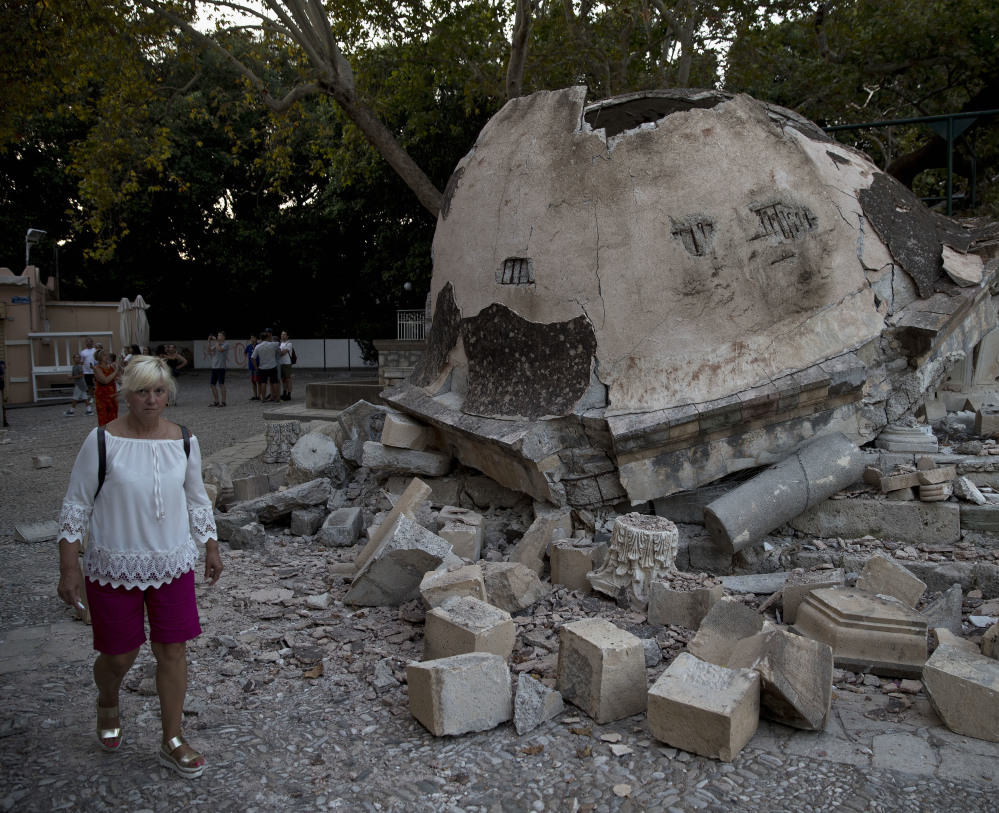KOS, Greece — Crews of experts began examining the damage to cultural monuments and infrastructure on the eastern Greek island of Kos on Saturday, a day after a powerful earthquake killed two tourists and injured nearly 500 others in the Aegean Sea region that stretches to Turkey’s sprawling coast.
Residents and tourists were still jittery as a series of aftershocks Saturday night continued to rock the island. A tremor measuring a preliminary 4.4 magnitude struck at 8:09 p.m. Saturday, sending residents and restaurant customers scurrying toward the middle of the town’s main square, as far away from buildings as possible.
Sixteen minutes later, a second 4.6-magnitude tremor struck, the Athens Geodynamics Institute reported. The first tremor had its epicenter only 12.5 miles northeast of Kos at a depth of 6.2 miles.
Hundreds of residents and tourists spent Friday night sleeping outdoors on the island, too afraid to return to their homes or hotels after the quake that struck early Friday. Many camped out in parks and olive groves, or slept in their cars or on beach and swimming pool lounge chairs.
The aftershocks Saturday night meant that many would spend a second night outdoors.
During the day in Kos, churches, an old mosque, the port’s 14th-century castle and other old buildings damaged in the quake were being checked by archaeologists and officials from Greece’s Culture Ministry.
The U.S. Geological Survey measured the quake Friday at magnitude 6.7, with Greek and Turkish estimates a fraction lower. Two men, a Turk and a Swede, were killed when a wall collapsed into a popular bar in the Old Town of Kos.
The most seriously injured in Greece were airlifted to hospitals on the mainland and the southern island of Crete, and at least two were still in critical condition Saturday.
Panagiotis Bekali, a 30-year-old resident, spent the night sleeping in an olive grove with relatives while his 5-year-old son and 16-year-old nephew slept in the family car.
“There were cracks in the house (from the earthquake) so we went straight out,” he said. “We were afraid to stay indoors, so the whole family slept outside.”
John Grant, a 60-year-old tourist from Britain, said he felt safer sleeping outside.
“Coming from somewhere that doesn’t have earthquakes, you don’t understand,” he said from his makeshift bed on a lounge chair. “So to me it was very frightening being in the building. But being outside, I know I’m safe.”
About 350 of the injuries occurred in Turkey, in Bodrum and other beach resorts, as people fled buildings and as a sea swell flung cars off the road and pushed boats ashore. Seismologists said the shallow depth of the undersea quake Friday was to blame for the damage.
Serif Damadoglou Soukri, the imam of Kos, said the greatest damage to Kos mosques was sustained by the central 17th-century Defternatar Ibrahim Pasa mosque, whose minaret, restored a few years ago, collapsed completely.
Copy the Story LinkSend questions/comments to the editors.



Success. Please wait for the page to reload. If the page does not reload within 5 seconds, please refresh the page.
Enter your email and password to access comments.
Hi, to comment on stories you must . This profile is in addition to your subscription and website login.
Already have a commenting profile? .
Invalid username/password.
Please check your email to confirm and complete your registration.
Only subscribers are eligible to post comments. Please subscribe or login first for digital access. Here’s why.
Use the form below to reset your password. When you've submitted your account email, we will send an email with a reset code.